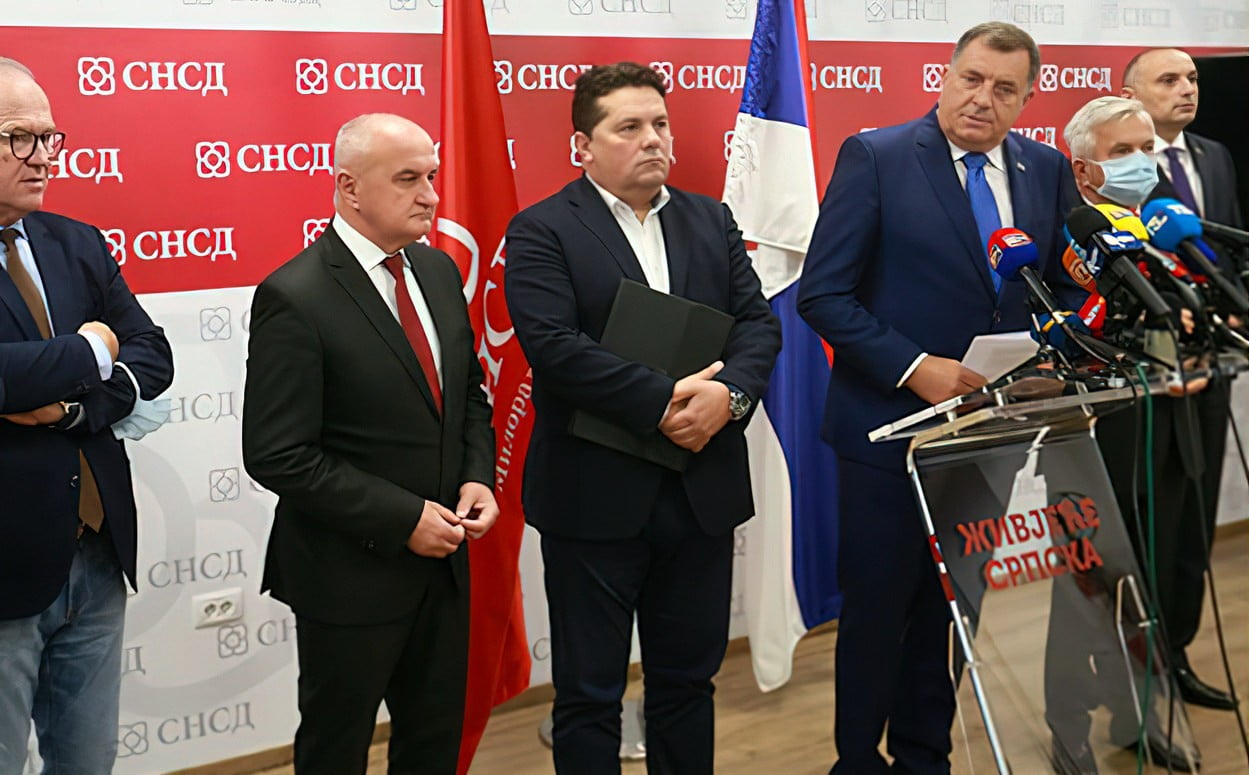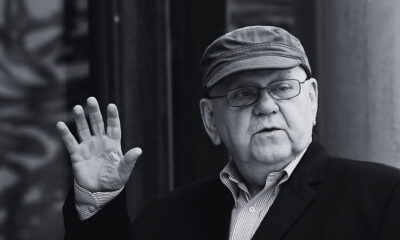Bosznia
NAGYOT NYERT, DE MÉGSEM ELEGET: Dodik pártja a következő ciklusban is többpárti szövetségben kormányoz, de nincs kétharmad

Milorad Dodik november 22-re hívta össze az általa vezetett Független Szociáldemokraták Szövetségével (Savez Nezavisnih Socijaldemokrata, SNSD) koalíció kötésre hajlandóságot mutató pártok vezetőit a koalíciós tárgyalások lefolytatására. A helyzet annyiban pikáns, hogy Dodik a szerb entitás elnökeként maga adhat kormányalakítási megbízást a pártját képviselő Radovan Višković számára. A boszniai szerb törvényhozásba október 2-i választáson bejutott pártok között várhatóan nem tud annyi támogatót szerezni az SNSD, hogy rendelkezzen a Dodik által vágyott 2/3-os felhatalmazással.
A kormánytöbbség megvan
Az október 2-i választás hivatalos eredményének közlését követően Milorad Dodik elégedetten nyugtázhatta, hogy pártja és annak négy hagyományosnak mondható szövetségese, az Egyesült Szerbség (Ujedinjena Srpska, US), a DEMOS, a Szocialista Párt (Socijalistička Partija, SP) és a Szerb Nemzeti Párt (Narodna Partija Srpske, NSP) által elnyert képviselői helyek száma elégséges a stabil kormányzáshoz a szerb entitásban.
Az SNSD 29, az US 4, a DEMOS 5, az SP 5, az NPS pedig 3 helyet szerzett, így összesen 46 képviselővel bírnak a 83 fős törvényhozásban. Dodik emellett az ellenzék által vitatott módon elnyerte a boszniai Szerb Köztársaság elnökének pozícióját is, és a pártja elnökségébe tartozó Željka Cvijanović váltotta őt a boszniai államelnöki testületben. Mindezek alapján kijelenthető, hogy az SNSD vezetőkkel szemben életbe léptetett nyugati szankciók, az Aleksandar Vučićtyal meglehetősen hideggé váló viszony, valamint a Vladimir Putyin melletti kiállás ellenére Dodik csapata nagyot nyert.
Mindez különösen annak a fényében jelenthető ki, hogy a boszniai szerb ellenzéki pártok a kampányt megelőzően tető alá hozott közös jelöltállítás ellenére is csak megismételni tudták a négy évvel korábbi eredményt. Az ellenzéki blokkhoz sorolható Szerb Demokrata párt (Srpska Demokratska Stranka, SDS) 13, a Demokratikus Fejlődés Platformja 8 (Platfoma Demokratskog Progresa, PDP), a Jogért és Rendért (Za Pravdu i Red) 4 helyet szereztek, vagyis összesen 30 képviselőjük lesz a parlamenti patkóban, ami egy hellyel elmarad a négy évvel korábbitól.
A Dodik-féle koalíció és az ellenzéki blokk között az elmúlt években rendre oldalt váltó szervezetek közül a Demokratikus Nemzeti Szövetség (Demokratski Narodni Savez, DNS) 4, a Szerb Szocialista Párt (Socijalistička Partija Srpske, SPS) 3 képviselővel fog bírni a következő ciklusban.
A szerb entitásban élő bosnyákok pártjának minősített Mozgalom az államért (Pokret za Državu) 4 helyet szerzett, ami elmarad a főbosnyák, Bakir Izetbegović SDA-elnök által megálmodott 7 helytől, amivel a bosnyák párt lehetett volna a mérleg nyelve a Dodik vezette pártszövetség és annak ellenzéke között egy erősebb ellenzéki szereplés esetén.
Közel a kétharmad
Bár a fentiek alapján a következő négy évben sem várható érdemi változás a politikai széljárásban a boszniai Szerb Köztársaságban, Dodik azonban nem lehet maradéktalanul elégedett. A 83 fős boszniai szerb nemzetgyűlésben a kétharmados többséghez 55 képviselőre lett volna szüksége. Ennek a támogatottságnak az elérése amiatt lett volna égetően fontos a szerb nemzet Miléje, értsd Dodik számára, mert az lehetőséget adott volna a boszniai országos parlamentben elfogadott törvények alkotmánybírósági kontrolljának kezdeményezésére.
A korábbi ciklusban Dodik több alkalommal végig játszotta, hogy az Államelnökség tagjaként az országos parlament által elfogadott jogszabály kapcsán az entitási parlamentnek megküldte a tervezetet, hogy az szavazzon, annak “vitális nemzeti érdeket sértő” jellegéről. Amennyiben Dodik rendelkezett volna az ilyenkor a Daytoni Egyezmény által megkövetelt kétharmados támogatottsággal, akkor a boszniai Államelnökség a szentesítés helyett meg kellett volna küldje normakontrollra a tervezetet a boszniai alkotmánybíróságnak, ahol aztán várhatóan évekig tartott volna a döntéshozatal.
A vitális nemzeti érdeken alapuló normakontroll lehetőségének megteremtése komoly eszköz lenne ahhoz Dodik kezében, hogy a szerb entitás elnöki székéből is érdemben befolyásolja a szarajevói jogalkotást. Ezért a mostani koalíciós tárgyalásoknak vélhetően az a legfontosabb célja, hogy Dodik felmérje az ellenzéki pártok közül, melyek mutatnak hajlandóságot az SNSD körül formálódó kormánykoalícióval való alkalmi vagy tartós együttműködésre.
A koalíciós tárgyalástól azonban az ellenzéki blokk mindegyik szervezete távol maradt. Az SNSD-vel korábban koalíciót alkotó Demokratikus Nemzeti Szövetség (DNS) és a térfélváltás esetleg kapható szocialisták (SPS) viszont képviseltették magukat a tárgyalásokon. A két törpe párt összesen hét képviselője azonban nem elég az 55 képviselői helyet jelentő kétharmados többség megszerzéséhez az SNSD-nek, mert az SPS és a DNS koalícióba való bevételével is csak 53 helyük lenne, vagyis két képviselői hely választaná el őket a Dodik által elérni kívánt céltól.
Kérdéses, hogy megéri-e Dodiknak újból szövetséget kötni az őt már egyszer hátra hagyó Nenad Nešić vezette DNS-el, és a kormányzati pozíciókat további pártok között szétosztani, vagy megelégszik a jelenleg reálisnak mutatkozó hatpárti koalícióval.
-

 Szerbia6 nap telt el azóta
Szerbia6 nap telt el azótaA jelek szerint Szerbia nemcsak Ukrajnának, hanem Izraelnek is szállít fegyvert 🇮🇱🤝🇷🇸
-

 Szerbia6 nap telt el azóta
Szerbia6 nap telt el azótaMagyarország nem támogatja Koszovó ET-tagságát, sem a Srebrenicáról szóló ENSZ-határozatot
-

 Szerbia5 nap telt el azóta
Szerbia5 nap telt el azótaCsapást mérhet-e a szerb Panda a kínai elektromos autókra?
-

 Szerbia3 nap telt el azóta
Szerbia3 nap telt el azótaVitték, mint a cukrot: Szabadkán ezernél is több ingatlan kelt el egy év alatt

































































